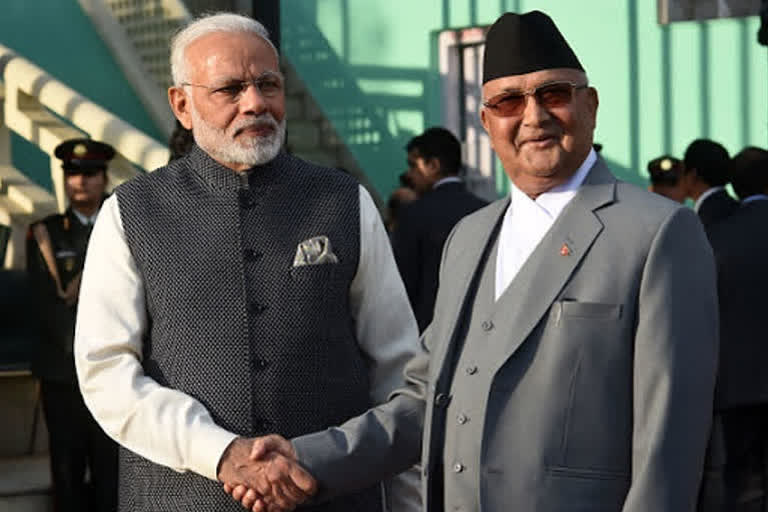New Delhi: Nepal is clearly drifting away from India. Prime Minister K.P. Oli has accused India of trying to unseat him because he has issued a new Nepali map, duly endorsed by Constitutional Amendment, claiming nearly 400 sq. kms of Indian territory in the Pithoragarh district of Uttarakhand.
Prime Minister Oli has been snubbed by his senior colleagues, Pushpa Kamal Dahal ‘Prachanda’, Madhav Kumar Nepal and Jhal Nath Khanal, all three former Prime Ministers, in the Standing Committee of the ruling Communist Party of Nepal. They asked him to produce credible evidence to support his charge against India, failing which he should resign both as a Prime Minister as well as Co-Chair of the Party.
This underlines the close nexus between the ruling Nepal Communist Party’s internal power struggle and its relations with India and other countries.
Problems for Prime Minister Oli arise from the accumulation of power in his hands at the cost of his senior colleagues. Prachanda, the co-chair of the party, blames Oli for not taking him into confidence on important decisions.
A party to party level dialogue was organised last month with the Communist Party of China without taking into confidence Madhav Nepal who looks after foreign relations of the party.
Read:India committed towards strengthening ties with Nepal: MEA
Oli is also holding two key party positions against the norms and has concentrated most of the administrative and financial powers in his hands, either directly or through his protégées.
Oli has also failed on the governance count, be it in dealing with the COVID-19 crisis, curtailing corruption or delivering on development promises.
This has made the government and the party unpopular with the people and threatens to erode its support base for future.
Oli is also opposed for his support for the US offer of $500mn assistance to Nepal under the MCC programme.
Oli has been trying to balance his isolation within the party by cultivating Opposition leaders, seeking Chinese support and by raking up anti-India nationalism. He did this at the time of drafting of the new Constitution in 2015, during parliamentary elections in 2017 and now again on the map issue.
There are reports that he has the tacit support of Sher Bahadur Deuba, the opposition Nepali Congress president. The map issue and claims on Indian territory were used to rake up anti-Indian Nepali nationalism to emerge as a staunch nationalist hero and silence his critics within and outside his own party.
In manipulating Nepali nationalism to serve his narrow personal political purpose, Oli has been facilitated by three factors. To begin with, it must be acknowledged that there is a new Nepal, young, aspiring, confident and acutely conscious of its identity.
Read:With Nepal PM under pressure to quit, parliament prorogued
The young Nepali generation, which constitutes more than 65% of the population, is empowered by democratic system, is exposed to the world at large through internet and migration (for work), is educated, skilled and self-confident, is not moved by cultural and civilizational ties with India and is not impressed by the clichés of special and unique – roti, beti – relations with India.
If at all, they look towards India for helping them fulfil their aspiration of development and comfortable lives. India is perceived to have fallen on that count.
The second factor, for the past many years so India had not undertaken any major developmental projects of high visibility and greater appeal to the youth, in Nepal.
India is seen as a country that seeks to micro-manage Nepal’s internal affairs through complacent, indifferent, arrogant and coercive diplomacy. India’s crude interference in Nepal’s Constitutional process in September 2015 which was followed by economic blockade for five months, that shattered normal life in Nepal, are cited as the recent examples of Indian approach.
These diplomatic blunders of India have alienated common people in Nepal. India also did not favour the Communist Party of Nepal and the leadership of Prime Minister Oli since 2015. India tried to soften its attitude towards the ruling regime in view of strong backlash from Nepal.
It also tried to expedite many of the pending projects including road and rail connections as well as oil pipeline, but that does not seem to have made much impact on the ruling regime or the anti-Indian orientation of Nepali nationalism.
WATCH:Nepal at the crossroads
China has fully exploited the growing Nepali alienation from India. It offered Nepal alternate trade transit route through Chinese ports and invested billions of dollars in building Nepal’s infrastructure through the Belt and Road initiative (BRI) projects.
China, through its deep pockets, has also encouraged political corruption in Nepal by luring elites across the entire political spectrum, while focussing on the ruling Communist Party.
The Chinese Ambassador in Nepal has in recent months been spotted by the Nepali media, meeting top Communist party leaders to help them patch up their differences to stabilise the Oli government.
China cannot openly support Nepal on the question of its Kalapani claims and the new map because it has recognised Lipulekh as the contact point between India and China for commercial and cultural transit in 1954 and 2015.
However, Nepal’s assertion suits Chinese interests and India-Nepal differences facilitate Chinese economic and strategic consolidation in Nepal.
India may find it increasingly difficult to curtail Chinese influence in Nepal despite its strong cultural, social and economic ties. What India needs is a complete overhaul of its approach to Nepal and reorientation of its diplomacy to make it more sensitive and accommodative towards the Himalayan neighbour’s emerging political tantrums.
History records that an assertive China has always posed a challenge to India’s engagement with its Himalayan neighbours.
(This article is written by Professor S D Muni, Emeritus, JNU and Member Executive Council, IDSA. He is also a former Ambassador and Special Envoy)
